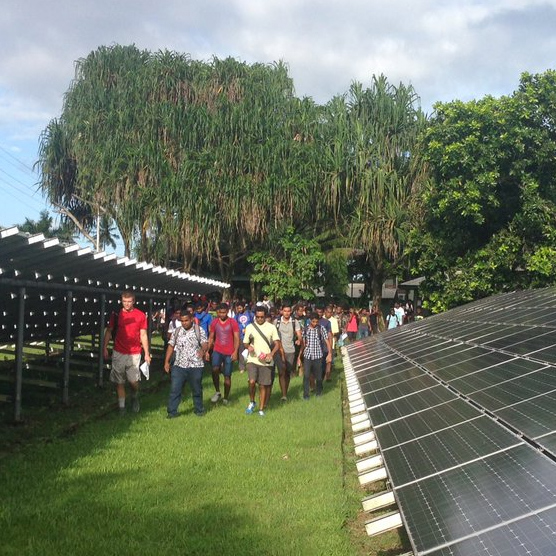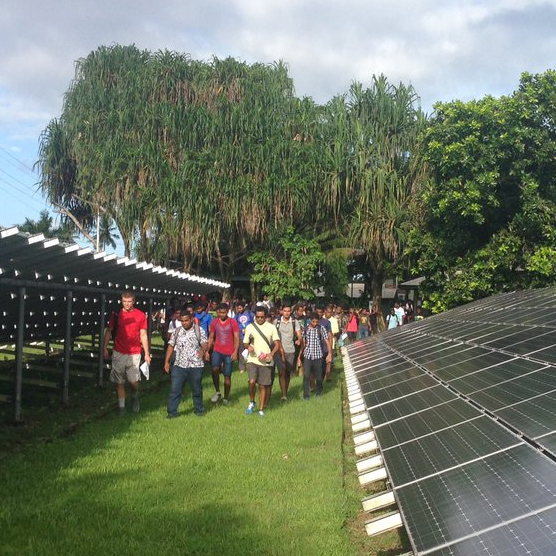Turning Trash to Treasure
Electrical Engineering student inspired by Fiji’s commitment to renewable energy brings home business idea
Last summer, Kenny Sheffler filled a water bottle with excrement from his brother’s dog and left the contraption in the sun. Within a day, the bottle had inflated and the waste had decomposed — turning into biogas and fertilizer.
“It was really disgusting,” said Sheffler, a junior at the University of Idaho. But the gross combo was the beginning stages of a clean energy system, aided by anaerobic digestion, which can produce fuel suitable for cooking and even heating homes.
An electrical engineering major in the College of Engineering, Sheffler was inspired to build his own backyard digester after studying at the University of the South Pacific (USP) in Suva, Fiji, during the 2017 spring semester. Nearly everyone living in the island’s rural communities has a similar, albeit more advanced, set up, Sheffler said. The reasons are twofold: the 7,056 square-mile country has little space for landfills; also, the citizens of the island nation experience the impacts of climate change on a daily basis.
It’s why the country aspires to become 100 percent reliant on clean energy by 2030, and it’s what attracted Sheffler to study abroad at USP in the first place. A Potlatch native, Sheffler has aspirations of working for a renewable energies firm on global projects — especially in developing nations vulnerable to the carbon footprint of larger countries like the U.S. and China.
Sheffler attributes the mentality of putting other people before oneself to his family. He’s the middle child of 14 siblings, seven of whom are adopted.
How Renewable Energy Impacts Fiji
At USP, Sheffler took a course that required labs related to each renewable energy source. Until then, he’d never heard of anaerobic digestion.
The process involves the breaking down of organic material — like food scraps or animal waste — in the presence of heat and water, but not oxygen. To use a digester, biodegradable materials are combined with water, fed through a pipe that empties into a tank, and given time to decompose. The end result is a biogas made primarily of carbon dioxide and methane that can be used as an energy source.
“People in Fiji don’t waste things,” Sheffler said. “All the food that they don’t eat, they put into anaerobic digesters in their backyard and they make their own cooking fuel out of them. It just breaks down their food into a biogas and they basically cook their next meal on their leftovers.”
Whatever food scraps remain are used as a fertilizer.
“In America, we take our garbage, put it in a trash can, and it’s out of sight out of mind,” Sheffler added. “We don’t see it again. And it doesn’t matter as much to us. But in Fiji, they’re so small, their garbage has to go somewhere.”
In addition to cutting back on landfill waste, Fiji’s commitment to renewable energy sources means their reliance on fossils fuels is shrinking. Climate change is harming the island because of the effects of ocean acidification on coral reefs, which locals depend on for fish habitat. Cities are also at risk of flooding due to rising sea levels and extreme weather.
“These big cyclones are getting more and more intense in the South Pacific,” said Sheffler, who saw the effects of Severe Tropical Cyclone Winston a year after it hit the island. “People are displaced from their homes for years at a time from climate change, and I got to see that directly. People were still living in tents that the Chinese had supplied. That was impactful.”
Bringing Renewable Energy Home
When he returned to the Palouse, Sheffler was committed to the task of introducing a full-size anaerobic digestion and biogas plant to Moscow.
Last October, he won a grant from U of I’s Sustainability Center to conduct a feasibility study on whether biogas from an anaerobic digester could offset the natural gas used at the university power plant. Wood chips are the primary fuel source at the U of I Steam Plant, but non-renewable natural gas, which releases significant carbon emissions, is reserved as a standby.
To determine the economic viability of his renewable energy system, Sheffler is assessing how much waste the university produces from three different venues: the Idaho Commons Food Court, the dairy center and landscaping services. He’s also accounting for waste that accrues at the city’s wastewater treatment plant and recycling center.
The biodegradable materials would be fed into an anaerobic digester to create the needed biogas fuel. As with the digesters Sheffler saw in Fiji, the remaining organic material could be used as fertilizer.
“It’s a dual benefit,” Sheffler said. “Everybody has waste and it has to be dealt with in some way. You might as well benefit from your own waste.”
In 2017, Sheffler won a Gold prize in the College of Engineering’s Grand Challenge Scholars Pitch Event. With his prize money, Sheffler is going to Michigan State University this spring to tour their anaerobic digestion plant. He’ll incorporate his findings into his feasibility study for U of I.
“Big countries like the U.S. that impact all the other countries in the world need to take a leadership stance on this,” Sheffler said.
Sustaining His Travel Bug
In addition to introducing digesters to the Palouse, Sheffler hopes to take his knowledge to other parts of the globe. Next winter, he plans to participate in a U of I Alternative Service Break trip, building digesters and other renewable energy technologies in rural Ecuador.
He also plans to travel with U of I’s chapter of the Humanitarian Engineering Corps to Carani, Bolivia, where students have been installing a potable water system. Sheffler wants to build and install a solar pump there.
His future travel plans — or at least those related to mitigating the effects of climate change in countries with developing economies — are a direct result of his experience in Fiji.
“Traveling is just eye opening,” he said. “I’ve seen the effects climate change has on the places we don’t see every day.”
But Sheffler learned another lesson, too: “When I got back I got rid of a ton of stuff that I’d lived without for five months,” he said. “Game systems, clothes. We have so much stuff, and you don’t need stuff to be happy.”

Article by Kate Keenan, College of Art and Architecture
Published in February 2018









